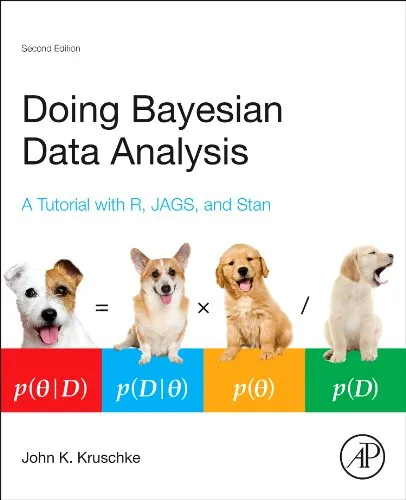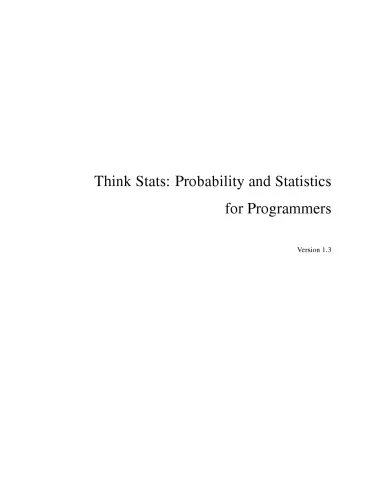Doing Bayesian Data Analysis: A Tutorial with R, JAGS, and Stan
4.7
Reviews from our users

You Can Ask your questions from this book's AI after Login
Each download or ask from book AI costs 2 points. To earn more free points, please visit the Points Guide Page and complete some valuable actions.Related Refrences:
Introduction to 'Doing Bayesian Data Analysis: A Tutorial with R, JAGS, and Stan'
Written by John Kruschke, 'Doing Bayesian Data Analysis' is a comprehensive guide that takes readers from the fundamentals of Bayesian inference to advanced modeling techniques. Whether you are a complete newcomer to Bayesian statistics or an experienced practitioner looking for a pragmatic tutorial, this book provides the tools, insights, and modeling approaches necessary to master Bayesian methods.
Detailed Summary of the Book
The book is thoughtfully structured to cater to beginners as well as those already familiar with Bayesian concepts. It starts gently with the core principles of Bayesian methods, focusing on the idea of combining prior information with observed data to draw inferences. This foundation is followed by hands-on tutorials that seamlessly bridge theory with application.
One of the defining features of the book is its emphasis on practical implementation. It introduces key probabilistic programming environments such as R, JAGS, and Stan to showcase how Bayesian models can be constructed and applied to real-world scenarios. From simple parameter estimation to hierarchical models and hypothesis comparison, the book systematically progresses through increasingly complex topics, ensuring clarity and understanding at every step.
An essential aspect of this text is its pedagogical commitment. The author includes intuitive visualizations, in-depth explanations, and step-by-step code examples that make Bayesian methods approachable for a broad audience. In addition, this second edition includes updated tools and augmented coverage of modern topics such as Markov chain Monte Carlo (MCMC) diagnostics, model checking, and generalized linear models.
By the end of the book, readers will not only understand Bayesian statistics conceptually but also gain the ability to effectively implement and explore Bayesian models in their own work.
Key Takeaways
- A robust foundation in Bayesian thinking: Understand how Bayesian statistics differs from frequentist approaches.
- Hands-on coding skills in R, JAGS, and Stan: Learn how to write and execute Bayesian models efficiently.
- Guided explanations of MCMC methods: Gain insights into how computational algorithms work under the hood.
- Practical examples and exercises: Apply Bayesian concepts to real-world problems, supported by code walkthroughs.
- Clear visualization techniques: Explore sophisticated data plots that highlight key insights from Bayesian analyses.
Famous Quotes from the Book
“The Bayesian approach is not just a mathematical formality; it is a way of systematically combining data and prior knowledge in a way that reflects uncertainty, evidence, and reasoning.”
“Priors are what make Bayesian methods uniquely powerful, allowing you to explicitly incorporate information you already know into your analysis.”
“Understanding the steps of model creation, fitting, and checking separates a practitioner from someone who merely runs software commands.”
Why This Book Matters
In an era of exploding data, the skill to contextualize and interpret information has become paramount. 'Doing Bayesian Data Analysis' equips readers with the tools to engage in probabilistic reasoning, develop intelligent models, and harness the insights derived from uncertainty quantification. Unlike one-size-fits-all plug-and-play statistical methods, Bayesian analysis demands an iterative, deep understanding of both data and context, which this book nurtures in its readers.
Furthermore, the accessibility of Bayesian tools in software like R, JAGS, and Stan has democratized probabilistic modeling. By focusing on these platforms, Kruschke ensures that readers not only learn the theory but also gain the computational proficiency to immediately start applying Bayesian methods in their field. This practical orientation makes the book an invaluable resource for students, academics, and professionals alike.
The second edition also aligns with the growing demand for rigorous statistical models that acknowledge the complexity of real-world phenomena. Whether addressing challenges in the social sciences, biology, marketing, or engineering, Bayesian methods offer unparalleled flexibility and insight. By choosing this book, readers are taking the first step toward mastering these indispensable techniques.
Free Direct Download
You Can Download this book after Login
Accessing books through legal platforms and public libraries not only supports the rights of authors and publishers but also contributes to the sustainability of reading culture. Before downloading, please take a moment to consider these options.
Find this book on other platforms:
WorldCat helps you find books in libraries worldwide.
See ratings, reviews, and discussions on Goodreads.
Find and buy rare or used books on AbeBooks.
1303
بازدید4.7
امتیاز50
نظر98%
رضایتReviews:
4.7
Based on 0 users review
"کیفیت چاپ عالی بود، خیلی راضیام"



